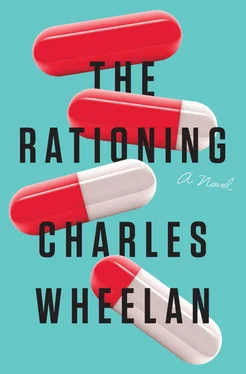“Yes, that would be perfect, if you can arrange it,” Patel said.
“This is her top priority,” the Ambassador assured him. The details for the meeting were fixed. The Ambassador immediately phoned the Secretary of State, who was attending a banquet hosted by the Royal Family. The paperwork for the flight to Delhi had already been prepared for this contingency; a pilot and flight crew were standing ready. The Secretary excused herself from the banquet, which had gone from tedious to excruciating over the course of the evening. And so, less than two hours after the Communications Director had issued the press release announcing a “scientific breakthrough” with regard to Capellaviridae , the Secretary of State and the Strategist were on an Air Force jet bound for India.
Upon landing in India, the Secretary of State found herself with a curious problem: she had no entourage. The American Secretary of State does not travel alone; no one on the Indian side would believe that she had been in Bahrain for meetings without a large complement of aides. The fact that she was traveling with the President’s top strategist and pollster would raise even more questions. The Indian Prime Minister was vain and self-interested, but he was no fool; if word leaked that the Secretary of State had been loitering in Bahrain without all the usual hangers-on, he would suspect a scheme. (Political schemers are, of course, most adept at detecting scheming by others.) The Ambassador solved this problem by “loaning” the Secretary of State eight embassy staff members, all with the requisite security clearance. “Follow her around, look obsequious, and don’t say anything to anyone,” he instructed them. Those eight “staffers” can now claim to be a footnote to one of the most famous negotiations in modern diplomatic history—as fake lackeys.
The Secretary of State was scheduled to meet with the Prime Minister at ten in the morning Delhi time. The Strategist would not attend the meeting; even his presence in India was secret for the reasons I alluded to above. Over breakfast, he coached the Secretary on strategy for dealing with the Prime Minister. “I’ve dealt with him on many occasions,” the Secretary said, peeved by the suggestion that the Strategist’s dark arts somehow trumped her deep knowledge of foreign affairs and diplomacy.
“You need to downplay this breakthrough on the virus,” he continued, ignoring—or, more likely, oblivious to—the Secretary’s vague hostility to his briefing.
“That’s the only leverage we have,” she said.
“No, no, no,” the Strategist insisted. “No.” He paused, like a professor who realized his student had not done the reading. “Look, the PM is a guy who’s always worried he’s getting played, because that’s what he’s always doing to other people. He’s always got an angle, so he assumes everyone else does, too.”
“I’m aware of that.”
“If you walk into the room and declare that American scientists have figured out Capellaviridae , he’s not going to believe you. If you tell him that we probably won’t need extra Dormigen, he’s going to ask why the hell you are sitting in New Delhi asking for it, right?”
The Strategist had captured the Secretary’s attention, if only by the convoluted nature of what he was arguing. And he had been right so far. The California Pizza Kitchen Summit was brilliantly choreographed, she had to admit. (Upon hearing the recap, the Strategist had yelled, “Mango fucking ice cream! I love it!”) The Secretary asked, “Our only leverage here is that we may develop some kind of vaccine in the eleventh hour—and I’m supposed to downplay that possibility?”
“Play possum,” the Strategist instructed her. “Tell him you really don’t think there’s time to develop a vaccine. Scientists are working on it around the clock, but they’re pessimistic… blah, blah, blah. That kind of thing.”
“Okay,” the Secretary said, still not sure where the strategy was headed.
“This is a guy who’s always wondering if he’s paranoid enough. If you tell him we’re on the brink of developing a vaccine, he’ll know you’re bluffing. But if you downplay that possibility, then he’s going to worry about the opposite: ‘Oh, shit, what if they pull off the vaccine right as I’m about to ride my white horse down Fifth Avenue?’”
“You really think he’s that callow?” the Secretary asked.
“What’s so callow about that? We all want to be the hero. We’ve set him up to think there’s a huge political payoff—which, by the way, there may well be. Just because we made up the poll numbers—”
“Stop,” the Secretary said sharply. “I don’t want to hear anything about that.”
“Anyway, I think he’s like anyone else. He doesn’t want a lot of people to die unnecessarily in the U.S., but if someone is going to prevent that, he wants it to be him.”
“You think this is going to work?” the Secretary of State asked.
“I have no idea, but I do know that if you’re holding a pair of twos, you don’t try and persuade people around the table that you’ve got four aces. You try to make them think that you’re trying to make them think that you have a pair of twos.”
“I don’t play poker.”
“Yes, that’s apparent.”
They were holding their discussion in a small, secure conference room at the U.S. Embassy (a curious building with offices arrayed around a large indoor fountain and pool that had allegedly inspired Jackie Kennedy to hire the same architect to design the Kennedy Center in Washington). The U.S. Ambassador knocked and then entered. “Your meeting has been pushed back to eleven,” he told the Secretary. “There was some shooting across the border in Kashmir and the PM is dealing with that.”
“Anything serious?” the Secretary asked.
“No, just the usual,” the Ambassador assured her.
The Secretary of State used the time to check in with the Chief of Staff, who pointed out a logistical reality that had not been top-of-mind. The U.S. was now, by our most recent estimate, three days from the point at which the existing Dormigen supply would have to be rationed. “Maybe a little sooner,” the Chief of Staff warned. “Doctors haven’t been as strict with Dormigen prescriptions as we had hoped.” She walked through the realities of the globe: Delhi was an eighteen-hour flight from New York. It would take additional time to distribute Dormigen across the U.S., particularly to rural areas. The Chief of Staff connected the dots for them: “If the Indian Prime Minister is going to save the day, that Dormigen is going to have to be on a plane sooner rather than later.”
IN WASHINGTON, THE NIH SCIENTISTS WERE HOPING TO REPLICATE the success of the Manhattan Project in a fraction of the time, albeit with the benefit of the Internet. The technical details of the most recent Capellaviridae breakthrough—the difference in the protein structure between the virulent and indolent viruses—were posted publicly with an invitation for teams of scientists anywhere in the world to explore the crucial questions: What caused the difference in the two forms of the virus? And how might the virulent form of the virus be rendered indolent? The hope was that “parallel science” might replicate the success of parallel computing, in which millions of personal computers linked together by the Internet had proved more powerful than even the largest supercomputer. The Scopes Foundation, a previously obscure philanthropy, offered a $1 million prize for a definitive answer to either Capellaviridae question, though the prize was quickly canceled at the behest of the Acting HHS Secretary, who feared that it would promote secrecy at a time when “massive openness” offered the only hope of a breakthrough in the little time available.
Читать дальше












